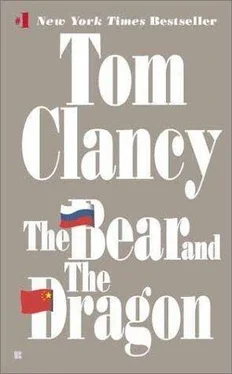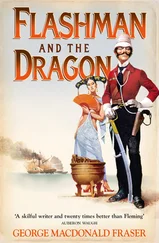Tom Clancy - The Bear and the Dragon
Здесь есть возможность читать онлайн «Tom Clancy - The Bear and the Dragon» весь текст электронной книги совершенно бесплатно (целиком полную версию без сокращений). В некоторых случаях можно слушать аудио, скачать через торрент в формате fb2 и присутствует краткое содержание. Год выпуска: 2001, ISBN: 2001, Жанр: Триллер, на английском языке. Описание произведения, (предисловие) а так же отзывы посетителей доступны на портале библиотеки ЛибКат.
- Название:The Bear and the Dragon
- Автор:
- Жанр:
- Год:2001
- ISBN:780425180969
- Рейтинг книги:3 / 5. Голосов: 1
-
Избранное:Добавить в избранное
- Отзывы:
-
Ваша оценка:
- 60
- 1
- 2
- 3
- 4
- 5
The Bear and the Dragon: краткое содержание, описание и аннотация
Предлагаем к чтению аннотацию, описание, краткое содержание или предисловие (зависит от того, что написал сам автор книги «The Bear and the Dragon»). Если вы не нашли необходимую информацию о книге — напишите в комментариях, мы постараемся отыскать её.
The Bear and the Dragon — читать онлайн бесплатно полную книгу (весь текст) целиком
Ниже представлен текст книги, разбитый по страницам. Система сохранения места последней прочитанной страницы, позволяет с удобством читать онлайн бесплатно книгу «The Bear and the Dragon», без необходимости каждый раз заново искать на чём Вы остановились. Поставьте закладку, и сможете в любой момент перейти на страницу, на которой закончили чтение.
Интервал:
Закладка:
“Greetings, General,” Golovko said. It was still afternoon in Moscow. “How are things at your end?”
“Tense, Comrade Chairman. What can you tell me of this attempt on the president?”
“We arrested a chap named Suvorov earlier today. We’re interrogating him and one other right now. We believe that he was an agent of the Chinese Ministry of State Security, and we believe also that he was conspiring to kill Eduard Petrovich.”
“So, in addition to preparing an invasion, they also wish to cripple our political leadership?”
“So it would seem,” Golovko agreed gravely.
“Why weren’t we given fuller information?” Far East demanded.
“You weren’t?” The chairman sounded surprised.
“No!” Bondarenko nearly shouted.
“That was an error. I am sorry, Gennady losifovich. Now, you tell me: Are you ready?”
“All of our forces are at maximum alert, but the correlation of forces is adverse in the extreme.”
“Can you stop them?”
“If you give me more forces, probably yes. If you do not, probably no. What help can I expect?”
“We have three motor-rifle divisions on trains at this moment crossing the Urals. We have additional air power heading to you, and the Americans are beginning to arrive. What is your plan?”
“I will not try to stop them at the border. That would merely cost me all of my troops to little gain. I will let the Chinese in and let them march north. I will harass them as much as possible, and then when they are well within our borders, I will kill the body of the snake and watch the head die. If, that is, you give me the support I need.”
“We are working on it. The Americans are being very helpful. One of their tank divisions is now approaching Poland on trains. We’ll send them right through to where you are.”
“What units?”
“Their First Tank division, commanded by a Negro chap named Diggs.”
“Marion Diggs? I know him.”
“Oh?”
“Yes, he commanded their National Training Center and also commanded the force they deployed to the Saudi kingdom last year. He’s excellent. When will he arrive?”
“Five days, I should imagine. You’ll have three Russian divisions well before then. Will that be enough, Gennady?”
“I do not know,” Bondarenko replied. “We have not yet taken the measure of the Chinese. Their air power worries me most of all. If they attack our railhead at Chita, deploying our reinforcements could be very difficult.” Bondarenko paused. “We are well set up to move forces laterally, west to east, but to stop them we need to move them northeast from their drop-off points. It will be largely a race to see who can go north faster. The Chinese will also be using infantry to wall off the western flank of their advance. I’ve been training my men hard. They’re getting better, but I need more time and more men. Is there any way to slow them down politically?”
“All political approaches have been ignored. They pretend nothing untoward is happening. The Americans have approached them as well, in hope of discouraging them, but to no avail.”
“So, it comes to a test of arms?”
“Probably,” Golovko agreed. “You’re our best man, Gennady Iosifovich. We believe in you, and you will have all the support we can muster.”
“Very well,” the general replied, wondering if it would be enough. “I will let you know of any developments here.”
General Bondarenko knew that a proper general-the sort they had in movies, that is-would now eat the combat rations his men were having, but no, he’d eat the best food available because he needed his strength, and false modesty would not impress his men at all. He did refrain from alcohol, which was probably more than his sergeants and privates were doing. The Russian soldier loves his vodka, and the reservists had probably all brought their own bottles to ease the chill of the nights-such would be the spoken excuse. He could have issued an order forbidding it, but there was little sense in drafting an order that his men would ignore. It only undermined discipline, and discipline was something he needed. That would have to come from within his men. The great unknown, as Bondarenko thought of it. When Hitler had struck Russia in 1941-well, it was part of Russian mythology, how the ordinary men of the land had risen up with ferocious determination. From the first day of the war, the courage of the Russian soldier had given the Germans pause. Their battlefield skills might have been lacking, but never their courage. For Bondarenko, both were needed; a skillful man need not be all that brave, because skill would defeat what bravery would only defy. Training. It was always training. He yearned to train the Russian soldier as the Americans trained their men. Above all, to train them to think-to encourage them to think. A thinking German soldier had nearly destroyed the Soviet Union-how close it had been was something the movies never admitted, and it was hard enough to learn about it at the General Staff academies, but three times it had been devilishly close, and for some reason the gods of war had sided with Mother Russia on all three occasions.
What would those gods do now? That was the question. Would his men be up to the task? Would he be up to the task? It was his name that would be remembered, for good or ill, not those of the private soldiers carrying the AK-47 rifles and driving the tanks and infantry carriers. Gennady Iosifovich Bondarenko, general-colonel of the Russian Army, commander-in-chief Far East, hero or fool? Which would it be? Would future military students study his actions and cluck their tongues at his stupidity or shake their heads in admiration of his brilliant maneuvers?
It would have been better to be a colonel again, close to the men of his regiment, even carrying a rifle of his own as he’d done at Dushanbe all those years before, to take a personal part in the battle, and take direct fire at enemies he could see with his own eyes. That was what came back to him now, the battle against the Afghans, defending that missited apartment block in the snow and the darkness. He’d earned his medals that day, but medals were always things of the past. People respected him for them, even his fellow soldiers, the pretty ribbons and metal stars and medallions that hung from them, but what did they mean, really? Would he find the courage he needed to be a commander? He was sure here and now that that sort of courage was harder to find than the sort that came from mere survival instinct, the kind that was generated in the face of armed men who wished to steal your life away.
It was so easy to look into the indeterminate future with confidence, to know what had to be done, to suggest and insist in a peaceful conference room. But today he was in his quarters, in command of a largely paper army that happened to be facing a real army composed of men and steel, and if he failed to deal with it, his name would be cursed for all time. Historians would examine his character and his record and say, well, yes, he was a brave colonel, and even an adequate theoretician, but when it came to a real fight, he was unequal to the task. And if he failed, men would die, and the nation he’d sworn to defend thirty years before would suffer, if not by his hand, then by his responsibility.
And so General Bondarenko looked at his plate of food and didn’t eat, just pushed the food about with his fork, and wished for the tumbler of vodka that his character denied him.
General Peng Xi-Wang was finishing up what he expected to be his last proper meal for some weeks. He’d miss the long-grain rice that was not part of combat rations-he didn’t know why that was so: The general who ran the industrial empire that prepared rations for the front-line soldiers had never explained it to him, though Peng was sure that he never ate those horrid packaged foods himself. He had a staff to taste-test, after all. Peng lit an after-dinner smoke and enjoyed a small sip of rice wine. It would be the last of those for a while, too. His last pre-combat meal completed, Peng rose and donned his tunic. The gilt shoulderboards showed his rank as three stars and a wreath.
Читать дальшеИнтервал:
Закладка:
Похожие книги на «The Bear and the Dragon»
Представляем Вашему вниманию похожие книги на «The Bear and the Dragon» списком для выбора. Мы отобрали схожую по названию и смыслу литературу в надежде предоставить читателям больше вариантов отыскать новые, интересные, ещё непрочитанные произведения.
Обсуждение, отзывы о книге «The Bear and the Dragon» и просто собственные мнения читателей. Оставьте ваши комментарии, напишите, что Вы думаете о произведении, его смысле или главных героях. Укажите что конкретно понравилось, а что нет, и почему Вы так считаете.






![Александр Ирвин - Tom Clancy’s The Division 2. Фальшивый рассвет [litres]](/books/417744/aleksandr-irvin-tom-clancy-s-the-division-2-falsh-thumb.webp)




